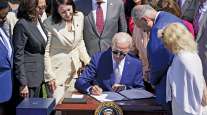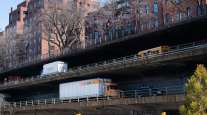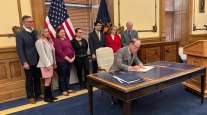Staff Reporter
Senate Democrats Debut Infrastructure Plan That Would Reverse Elements of GOP Tax Overhaul

Less than a month after President Donald Trump unveiled his infrastructure proposal, Senate Democrats released an infrastructure plan of their own.
Senate Majority Leader Chuck Schumer (D-N.Y.) and his colleagues released a plan March 7 that aims for a $1 trillion federal investment. To finance this investment, the plan proposes rolling back many of the provisions outlined in the tax reform legislation that was passed late last year.
Specifically, the Democrats’ plan would restore the top individual tax rate to 39.6%, raise the corporate tax rate to 25% and revert the estate tax to its previous parameters. The estate tax is levied on the transfer of the estate of a deceased person.
In 2017, the estate tax applied to families with estates worth more than $11 million. Trump’s legislation doubled the exemption to $22 million. Representatives from trucking companies, many of which are family owned, have expressed enthusiasm at the prospect of ending the estate tax.

Leahy
“Our plan does not rely on Trump Tolls that would line the pockets of wealthy developers. It does not force the burden on already cash-strapped states,” Sen. Patrick Leahy (D-Vt.) said in a statement. “This is a real investment in our infrastructure. An investment that makes infrastructure the priority that it needs to be.”
According to the plan, state and local government agencies face an $836 billion roadway maintenance backlog. To redress this backlog, the plan dedicates $140 billion to repair roads and bridges through the federal-aid highway program, Federal Lands and Tribal Transportation program, and a new Bridge Investment Program. The American Road and Transportation Builders Association published an analysis Jan. 29 revealing that more than 54,000 of the nation’s 612,000 bridges are structurally deficient.
The plan from the Democrats also proposes $10 billion to expand the Transportation Investment Generating Economic Recovery grants, which offer discretionary funding for state and local government agencies to conduct infrastructure projects. Trump’s budget proposal included no funding request for the TIGER program.

Senate Finance ranking member Ron Wyden (D-Ore.) speaks at the Democrats' unveiling of their own infrastructure plan. (J. Scott Applewhite/Associated Press)
The Highway Trust Fund, which assists states with maintenance and construction projects, would receive $140 billion over the next 10 years through the Democrats’ plan. Improvements in fuel consumption and shifting driving habits contribute to the account’s steady decline, prompting several general fund transfers in recent years to maintain its solvency.
The Democrats’ plan would support many spheres of infrastructure, from roads and ports to wastewater systems and schools. Schumer also stressed the importance of broadband connectivity, especially in rural communities. In 2016, the Federal Communications Commission found that more than 34 million Americans, including 23 million rural Americans, do not have high-speed internet service available to them.
“This isn’t your grandfather’s infrastructure plan,” Schumer said at a press conference March 7. “We’re going to build infrastructure of the 21st century.”
Trump’s infrastructure plan calls for $200 billion in direct federal funds to reach a $1.5 trillion over 10 year, an idea that Sen. Tom Carper (D-Del.) called “a reinvention of common sense and reality.”
Sen. John Barrasso (R-Wyo.), who serves as chairman of the Senate Committee on Environment and Public Works, said that the Democrats’ plan would take Americans’ “hard-earned” money away from them. Barrasso said that 90% of American workers have seen more money in their paychecks because of the tax relief law.
“If Chuck Schumer and the Senate Democrats spent more time working with Republicans on infrastructure and less time thinking of new ways to raise taxes on hard-working Americans, we would be making more progress,” Barrasso said. “The Democrats’ plan is clearly about raising taxes on American families, not upgrading our roads, bridges and water systems.”




